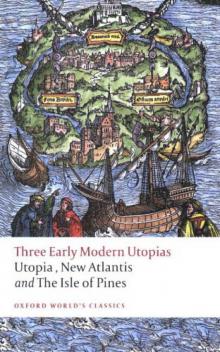Three Early Modern Utopias: Thomas More: Utopia / Francis Bacon: New Atlantis / Henry Neville: The Isle of Pines 

by Thomas More
Genre: Other8
Published: 2009
View: 3406
Read OnlineRead Three Early Modern Utopias: Thomas More: Utopia / Francis Bacon: New Atlantis / Henry Neville: The Isle of Pines Storyline:
With the publication of Utopia (1516), Thomas More provided a scathing analysis of the shortcomings of his own society, a realistic suggestion for an alternative mode of social organization, and a satire on unrealistic idealism. Enormously influential, it remains a challenging as well as a playful text. This edition reprints Ralph Robinson's 1556 translation from More's original Latin together with letters and illustrations that accompanied early editions of Utopia. This edition also includes two other, hitherto less accessible, utopian narratives. New Atlantis (1627) offers a fictional illustration of Francis Bacon's visionary ideal of the role that science should play in the modern society. Henry Neville's The Isle of Pines (1668), a precursor of Defoe's Robinson Crusoe, engages with some of the sexual, racial, and colonialist anxieties of the end of the early modern period. Bringing together these three New World texts, and situating them in a wider Renaissance context, this edition--which includes letters, maps, and alphabets that accompanied early editions--illustrates the diversity of the early modern utopian imagination, as well as the different purposes to which it could be put. About the Series: For over 100 years Oxford World's Classics has made available the broadest spectrum of literature from around the globe. Each affordable volume reflects Oxford's commitment to scholarship, providing the most accurate text plus a wealth of other valuable features, including expert introductions by leading authorities, voluminous notes to clarify the text, up-to-date bibliographies for further study, and much more.About the AuthorSir Thomas More (1478-1535) was an English lawyer, author, and statesman who in his lifetime gained a reputation as a leading humanist scholar, and occupied many public offices, including Lord Chancellor (1529 1532), in which he had a number of people burned at the stake for heresy. More coined the word "utopia", a name he gave to an ideal, imaginary island nation whose political system he described in the eponymous book published in 1516.Pages of Three Early Modern Utopias: Thomas More: Utopia / Francis Bacon: New Atlantis / Henry Neville: The Isle of Pines :